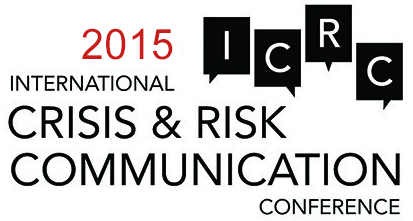Preconference
Pre-Conference Workshop: Calming the Storm: Strategies on How to Help Those in Crisis
This interactive training will give you a deeper understanding of people in crisis; provide you with strategic, proven methods on how to compassionately communicate and care for those experiencing a critical event; and offer the opportunity for you to practice the skills learned in a controlled environment with small group exercises. This workshop addresses how to compassionately care for individuals and large groups.
Additionally, you will receive a handbook full of practical applications. Many have commented on how helpful it is after getting back to the office.
Participants will learn:
- The three key components of Psychological First Aid.
- Crisis communication techniques, including the dos and don’ts.
- How to manage the masses with five organizational strategies for humanitarian support.
- Increase their resilience in managing crisis; personally and victim related.
Pre-Conference Workshop: Protecting Your Organization or Company with a Scalable Social Media Risk Strategy
The session begins by examining the components of a sound social media risk strategy, and moves on to replicate a variety of crises that require crisis messaging leveraging Firestorm® Message Maps. Participants will be coached through formulating a social media crisis strategy and identifying engagement opportunities or threats via monitoring tools and approaches.
Throughout this highly interactive session, participants will be organized into response teams to manage rapid-fire scenarios that replicate the “blind-side” of social media risk.
Topics Covered
This interactive course will help participants:
- Begin to develop custom, organization-specific, social media risk crisis response strategies
- Identify and utilize monitoring tools and approaches
- Recognize resources, and establish and train back-up responders before a crisis
- Take action, if accounts are hijacked or locked out
- Understand ROI and ROnI (Return on No Investment) of a Social Media Risk Strategy
Impact
Participants will be able to:
- Craft a Sound Social Media Risk Crisis Response Policy
- Monitor Merged Media for Crisis and Calm
- Create Firestorm® Message Maps for Social Tools
- Identify Emerging Crises
- Respond in a Crisis
- Report after a Crisis
Pre-Conference Workshop (Monday Mar 2):
Emergency Communication Effectiveness
Robert C. Chandler,
With Discussion Section on Multilanguage Emergency Alerting Issues, to include:
Federico Subervi
Arlyn Rivera-Elizee
Katie Coronado
Anthony Morejon
The capability to provide effective, appropriate disaster alerts during major, sudden or logistically complex disasters involves preplanning to ensure that notifications can be delivered and understood rapidly and effectively by diverse audiences, and by individuals who will be experiencing heightened or prolonged stress.
This presentation outlines the stages of crisis and the crisis-stress factor, which may significantly impact human cognitive functioning. Types of specific informational needs at each crisis stage will also be outlined, and other considerations for effective message construction and delivery will be discussed. The phenomena of “first language reversion during crisis,” reported by a number of bilingual or multilingual individuals who have experienced crisis stress, will be recounted.
In the U.S. citizenry, growing multilanguage populations, including those with limited English proficiency, challenge the feasibility of providing effective emergency alerts during major widespread disasters. Recent crises such as Hurricane Sandy and other disasters have shown significant vulnerabilities in this area, in terms of effectively reaching all audiences with proper messages, especially when individuals become displaced, power is lost, and crucial messages simply must be received and understood.
Crisis and risk communication professionals such as public service providers, national and local broadcast professionals, and legal experts weighed in with the Federal Communication Commission earlier this year with concerns and issues on this complex topic, initially raised as a result of tragic implications during Hurricane Katrina. Many questions and challenges remain.
Appropriate language and vocabulary choice, as well as possible cultural contexts will be shared, along with several other foundational strategy suggestions for creating better emergency messages.
Participants in this workshop will form case study-based discussion groups, wherein they will collaborate regarding what tools and techniques they use, under which conditions, in order to effectively analyze audience demographics, prepare messaging strategy, and otherwise optimize their emergency messaging communication effectiveness.
Pre-Conference Workshop: Message Matrix® Workshop
A crisis has occurred and you are being bombarded with questions … from media, customers, internal stakeholders, family and friends. When faced with an onslaught of questions and the 24-hour rumor cycle, avoiding speculation, communicating consistently and sharing information strategically requires a disciplined approach to crisis communication. In a crisis environment, how can spokespersons measure the effectiveness of their communication efforts, and how can they remain accountable to their organizations and to the public in terms of ethics and transparency?
Curley & Pynn Public Relations Management has managed crises both big and small for local, national and international organizations, and has built lessons learned into its Message Matrix® training program, which guides clients through a process of issue identification and message consistency, allowing spokespersons to view questions not as requirements to answer but as opportunities to respond with consistent, prepared messaging.
Curley & Pynn Vice President Dan Ward, APR, CPRC and Communications Strategist Heather Keroes, APR, will lead a half-day Message Matrix® workshop to provide Conference attendees with a step-by-step process to communicating in times of crisis, so that when a crisis occurs, they are confident, composed and prepared to respond to any question.


